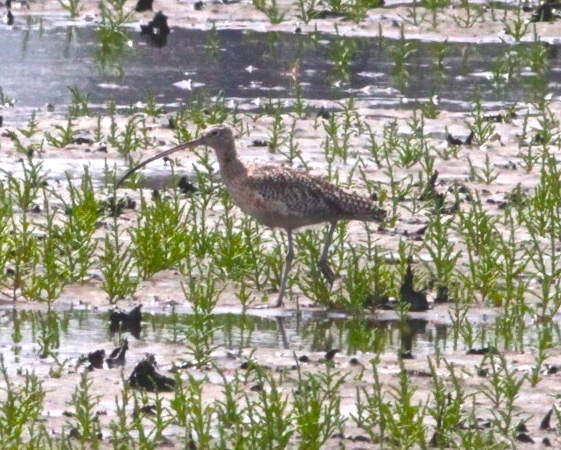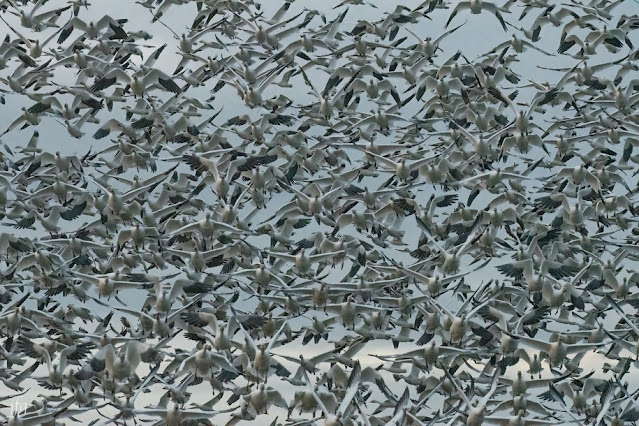A roundup of the week's news of birds and the environment:
The very appropriately named Long-billed Curlew takes a stroll along the edge of the Gulf.*~*~*~*
We all know about the pleasures of bird watching but it turns out there are positive health benefits as well. And perhaps the greatest benefits can be realized by "slow birding."
*~*~*~*
California's most famous and beloved mountain lion, P-22, is getting quite aged for a cat in the wild and may be experiencing distress. Wildlife officials are planning to capture the big cat to assess his health.
*~*~*~*
And, in fact, P-22 has now been captured and taken to a wild animal facility for that assessment. The assessment revealed he probably had been hit by a car at some point. It is unlikely he will be returned to the wild.
*~*~*~*
The Arctic's weather is changing, becoming wetter and stormier. The effects of such changes will be widespread, reaching far beyond the Arctic.
*~*~*~*
A Maryland couple decided to make their yard a habitat instead of a boring lawn and they ended up changing a state law.
*~*~*~*
Are you familiar with a website called iNaturalist? If not, maybe you should be.
*~*~*~*
Meet the American Bird Conservancy's Bird of the Week: the Allen's Hummingbird.*~*~*~*
The right-wing's fever dream for years has been to build a wall along the border with Mexico and now Arizona's governor who has poorly disguised ambitions for higher office has made their dream come true by stacking shipping crates along the border to make what must be an impregnable wall!
*~*~*~*
A humpback whale suffered a broken back, probably after being hit by a boat, but that did not deter her from making her 3,100-mile migration from British Columbia to Hawaii.
*~*~*~*
A flurry of births among the gray wolves of California is proof of the species' amazing comeback in a state where they had been exterminated a century ago.
*~*~*~*
Brazilian gold miners are laying waste to the forest in an Amazon reserve.
*~*~*~*
Scientists are raising concerns about the potential for a population collapse among critically endangered eels.
*~*~*~*
There's very bad news from the world's forests: In Oregon, millions of conifers have suffered a record die-off. And in the East, ash trees are vanishing due to an onslaught from the ash borer.
*~*~*~*
But there is some hope. In Haiti, a magnolia that had been thought to be extinct for a hundred years has been found alive and well.
*~*~*~*
In Canada, the critically endangered caribou has been given protection under the Endangered Species Act.
*~*~*~*
The benefits of cover crops in agriculture have long been known and now farmers in the Midwest have heeded the call to repair the soil and slow erosion by planting them.
*~*~*~*
Snow Geese in flight. How do they keep from bumping into each other?


Good morning, Dorothy: Thank you for the roundup. This morning Miriam and I will be participating in the annual Christmas Bird Count, where the number of birds and the species mix is diminishing year after year. Even "common" species are in decline. We ravage this little planet and its inhabitants more every day. As for iNaturalist, I currently have 14,838 entries on that site.
ReplyDeleteAh, the CBC! I hope you find lots of healthy birds!
DeleteSo many links this week that struck a chord. Turning yard into a habitat. That poor humpback whale. P-22 who was euthanized. The endless benefits of bird watching. And what is it with the Arizona government and shipping containers? They're using them, not only as a border wall, but to house the homeless here in Phoenix as well!
ReplyDeleteOMG! Well, I suppose on second thought it is better than having no place to lay your head, but seriously, can't we do better?
DeleteI saw the article on the benefits of birding. I felt those over the past few years when we isolated ourselves from others but didn't have to worry about the birds.
ReplyDeleteI'm a huge fan of iNaturalist. What a great tool it is for citizen science.
I agree that iNaturalist is a valuable site, especially for all of us "amateurs."
Delete